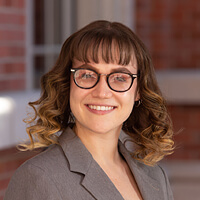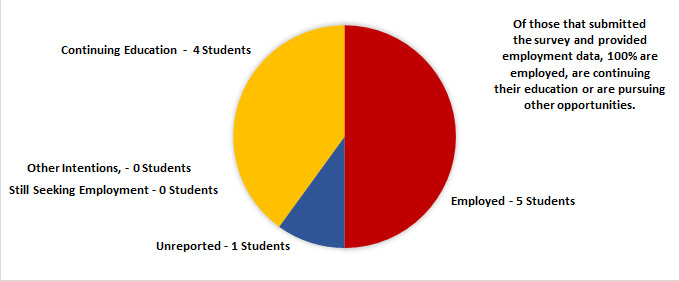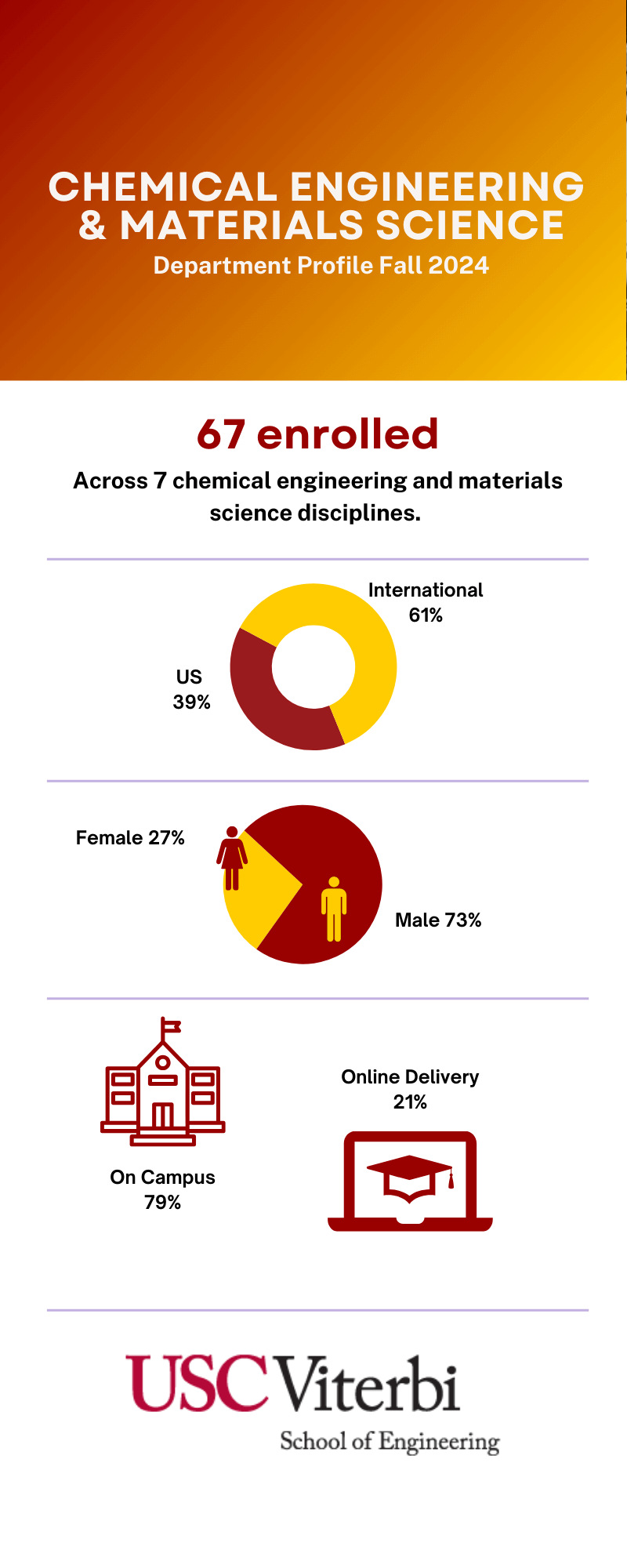Chemical Engineering is the engineering discipline which makes extensive use of chemical transformations in addition to physical transformations to achieve added value. Because all manufacturing involves chemical transformations in one way or another, chemical engineers are employed in virtually all manufacturing industries, from the basic chemical, materials, energy, food, pharmaceutical and microelectronics industries to the myriad consumer products industries.
Students in the MS in Chemical Engineering program will take a number of advanced courses in key fundamental chemical engineering areas such as transport phenomena, applied mathematics, thermodynamics, kinetics and reaction engineering. In addition, students will select a number of electives courses to develop knowledge and expertise in specialized fields such as energy engineering, materials engineering, bioengineering, environmental engineering, engineering design, and control management.
International Students: This program is eligible for the OPT STEM extension.
- This program requires completion of 28 units of coursework
- Thesis option and Directed Research (research without thesis) may be requested after completing first semester. Thesis option is not guaranteed
- USC Catalogue
- USC Schedule of Classes
APPLICATION DEADLINES
| SEMESTER | DEADLINE |
| Spring | September 1 |
| Fall | December 15 |
Visit our Ready to Apply page for more information
ELIGIBILITY CRITERIA
Applicants to the master's of science programs in Chemical Engineering are required to have a bachelor’s degree or be in the process of completing a bachelor's degree. Degrees in any engineering or engineering-related disciplines are frequently represented among our program applicants, including but not limited to the following:
- Chemical Engineering
- Chemistry
- Mechanical Engineering
Applications are reviewed holistically; simply taking these courses does not guarantee admission.
APPLICATION REQUIREMENTS
The following materials are required to be included with your online application:
- Transcripts
- Resume/CV
- Personal Statement
- Letter of Recommendation (3 required)
NOTE: The GRE is not required for 2026 applications.
The following link will take you to an overview of the tuition & fees for graduate engineering students, including payment information. Both on-campus and DEN@Viterbi students pay the same tuition
TUITION AND FEES OVERVIEW
Use the link below to download the Cost of Attendance to see a summary of tuition and fees by semester. The document is a typical example and the number of courses, and time to complete the program, will vary by student.
Estimated Cost of Attendance - 28 Unit Program
 BELINDA GARANA
BELINDA GARANA
What are some personal achievements or experiences you’d like to share?
I would love it if everyone knew about the algorithm I developed to identify drug mechanisms-of-action which may benefit cancer patients based on their gene signature. You can access it here: https://github.com/BelindaBGarana/DMEA.
Which organizations/activities have you been involved with outside of the classroom?
I have primarily been involved with leading the club I started at USC, Women in Chemical Engineering, but I also serve as a Liaison for USC Women in Science and Engineering.
.
 ALISON KENNEDY
ALISON KENNEDY
What were the main reasons you chose to pursue this graduate program at USC?
I was really interested in my research group! I work with Professor Nutt in the M.C. Gill Composites Center, which has been a great fit since I'm really passionate about the work. I studied polymer science and engineering for my undergrad, and worked in the composites group at Case Western Reserve University so I feel that my skills are very applicable. I also liked that the department houses both chemical engineering and materials science, especially since my bachelors degree sits in between. I've been learning so much, but can still use everything I've learned since the department and lab are both very interdisciplinary!
Which organizations/activities have you been involved with outside of the classroom?
I'm a Mork Family Department senator for the Viterbi Graduate Student Association! It's been a great opportunity to meet other students, especially after a few years of being remote. I also have a mentorfrom Women in Science and Engineering (WISE), and they've been super helpful. It's really nice to talk to someone who has been through the program and can help set some of my expectations!
.
 ALEXIS OYETIBO
ALEXIS OYETIBO
Tell us a little bit about yourself
I studied Chemical Engineering in my Bachelor's program at Howard University and completed three summer internships: 1. Summer research student at Harvard University, 2. Research and development intern at Kraft Foods Group, and 3. Research and engineering intern at ExxonMobil,.
Tell us about your interests outside the classroom.
I was an active member of the Mork Family Department Graduate Student Association and the National Society of Black Engineers. I also participated in activities organized by USC Christian Challenge, a campus ministry that held events such as discipleship conferences and bible studies. Additionally, I love outdoor activities and playing sports.
Overall, how was your USC journey?
My experience at USC was awesome. I learned the importance of networking, developed professionally, and formed lifelong friendships. I am proud to be a member of the Trojan family.
2022 First Destinations Survey - Outcomes*

Alumni Employment - 2022*
(Companies & Job Titles)
- CarbonFree - Process Engineer CAUCCU
- DPS Group - Process Engineer
- KLA-Tencor Corporation - Product Engineer
- Marlabs, Inc. - Trainee Software Programmer 1
- University of Southern California - Research Assistant
Previous Years
- FDM Group - IT Consultant
- Malmstadt Lab USC - Research Assistant
- Microsoft - Software Engineer
- Northrop Grumman Corporation - Systems Engineer
- Northrop Grumman Corporation - Principal Systems Engineer
- Pharmavite LLC - ACE Engineer
- Rang Technologies - Clinical Data Analyst
- Southern California Gas Company - Project Engineer
- SpaceX - Operations Engineer
- Thousand Oaks Biopharmaceuticals, Inc.
.
Internships (Summer 2023)**
Tesla, Inc.
Previous Years
Facebook Inc.; Fluxergy; Kelly Science, Engineering, Technology & Telecom; Los Alamos National Laboratory; L&T Technology Services Limited; Lucid Group, Inc; Polycoat Products; WePay, Inc.; Wildcat Discovery Technologies
.
.
* Information is based on a voluntary survey and should not be interpreted as a comprehensive view of the 2022 graduating class.
** Internship data is from CPT internships done by our international student population.
This program is also available online to professional engineers through DEN@Viterbi. Because the DEN@Viterbi program provides a fully equivalent academic experience, the degree a USC engineering student earns is the same whether they are on-campus or online.
If you are interested in beginning classes as a DEN@Viterbi student next semester, explore the requirements and steps to enrolling as a Limited Status Student.
Learn More About DEN@Viterbi
Detailed Program Curriculum and RequirementsSchedule of Classes
DEN@VITERBI ONLINE COURSE OFFERINGS
The following courses and program requirements serve as program planning for DEN@Viterbi students. Course offerings and availability are subject to change. Please consult with advisor if you have any questions.
| Required Courses |
| All courses are required - 16 units total. |
| CHE 501 | Modeling and Analysis of Chemical Engineering Systems (4 units) |
| CHE 530 | Thermodynamics for Chemical Engineers (4 units) |
| CHE 538 | Transport Processes (4 units) |
| CHE 542 | Chemical Engineering Kinetics (4 units) |
| Elective Courses |
| Elective courses must be approved by the department. Students can apply 400 level classes towards elective requirements per adviser's approval. Please note that Graduate Students Cannot Count More than 9 units of 400 Level Courses towards their MS Degree. - 12 units total. |
Deficiency Courses
|
| Students without a B.S. in Chemical Engineering must complete deficiency courses at USC. Units from these deficiency courses cannot be applied towards the M.S. in Chemical Engineering. If you have questions about deficiency courses please consult with your department advisor. |
Please complete the following form for more information.






